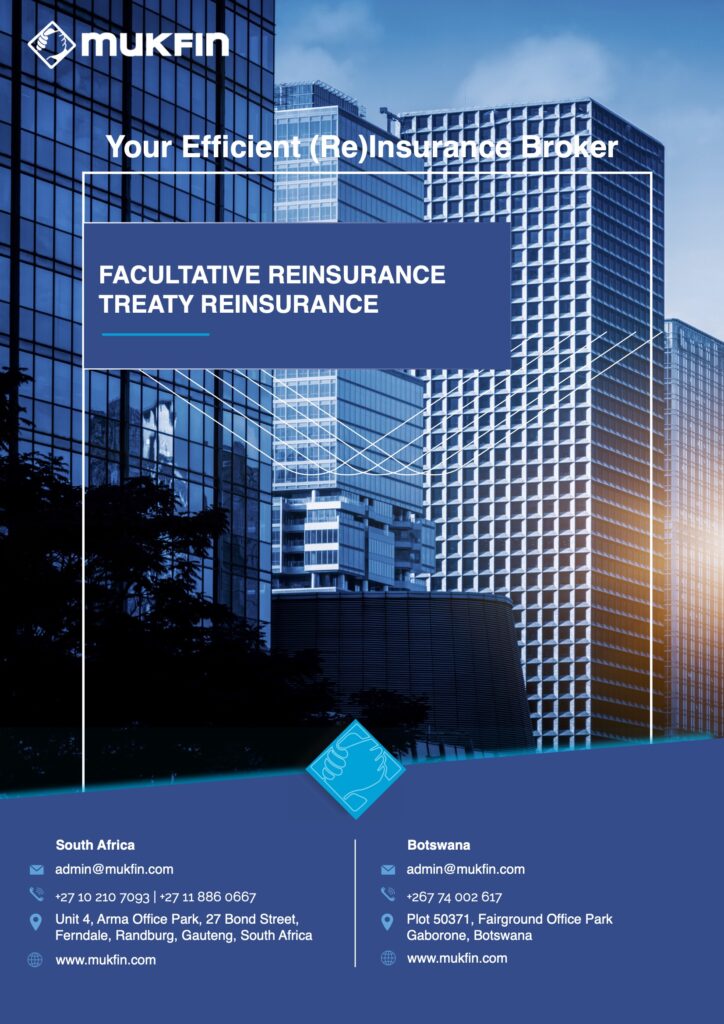Pacxedes Mukonzo, Client Relationship Manager, Mukfin.
The global insurance industry has witnessed a significant shift in recent years as emerging markets have become increasingly attractive for reinsurers.

Due to the rapid economic growth, demographic change, urbanisation, and digitalization taking place in Africa, numerous prospects are rising in the reinsurance sector. These markets offer immense growth potential, but they also come with their own set of opportunities and challenges. In this article, we will explore the exciting possibilities and the hurdles faced by reinsurers when providing coverage in emerging markets.
The nature of reinsurance emerging markets.
Regulatory Differences
Emerging markets often boast distinctive regulatory frameworks that differ from their established counterparts. Reinsurers must navigate these complexities to ensure compliance and effectively operate within the local legal and regulatory environments. Understanding local regulations, licensing requirements and capitalisation standards is essential to establish a strong foothold.
Cultural Considerations
Cultural differences play a crucial role in shaping business practices and customer expectations in emerging markets. Language barriers, varying negotiation styles and differing business etiquette require reinsurers to adapt and establish strong relationships with local partners. Investing in building cultural intelligence and fostering cross cultural collaboration can enhance trust and facilitate successful partnerships.
Unique Risk Profiles
Emerging markets are characterised by unique risk profiles, influenced by factors like political instability, currency fluctuations, inadequate infrastructure, and exposure to natural catastrophes. Reinsurers must develop a deep understanding of these risks to accurately price reinsurance coverage and provide appropriate risk management solutions. Collaborating with local experts, leveraging advanced risk modelling tools, and investing in sophisticated underwriting capabilities are crucial to effectively manage these risks.
Opportunities
- Untapped Market Potential
The average level of insurance penetration in Africa estimated at 2.7% is almost half the average global insurance penetration which is 6.9%. This points to significant scope for growth. Emerging markets offer reinsurers a vast untapped market potential. Growing economies and expanding insurance industries translate into increased demand for reinsurance products. By entering these markets early, reinsurers can access a larger customer base and secure a competitive advantage.
- Economic Growth
Rapid economic growth in emerging markets translates into rising insurable assets, creating opportunities for reinsurers to expand their portfolios. Emerging markets often require massive infrastructure development including transportation, energy, and telecommunications. The substantial risks involved in these projects can be mitigated through reinsurance. Reinsurers can support infrastructure development by providing coverage for construction risks, property damage, liability, and other related risks.
- Diversification
Reinsurers operating in mature markets often face concentrated risks associated with specific regions or countries. Reinsurers seeking to diversify their risk exposure, emerging markets provide an excellent opportunity. By expanding into emerging markets, reinsurers can access new geographical regions with different risk profiles as well as various lines of business. There is also an aspect of currency diversification which can help to mitigate the risks associated with currency fluctuations and provide potential currency-related gains. Expanding geographically reduces reliance on mature markets and spreads risk across a broader range of economies and risk profiles.

Your Efficient (Re) Insurance Broker
FACULTATIVE REINSURANCE
TREATY REINSURANCE
- Regulatory Reforms
The implementation of regulatory reforms is typically aimed at enhancing market stability, promoting consumer protection, and fostering industry growth. These reforms often include establishing of robust regulatory frameworks for example the development of risk-based capital requirements, corporate governance standards and enhanced disclosure and reporting obligations. The reforms establish an environment that is more favourable for reinsurance companies to conduct operations and make investments within the region.
Challenges
- Capacity and Talent Development
Emerging markets may have limited reinsurance capacity and a shortage of skilled professionals. There may be a shortage of skilled professionals who possess in depth understanding of reinsurance practices, underwriting, risk assessment and claims management. This hinders the development of a competent workforce capable of meeting the complex demands of the reinsurance industry. Reinsurers must invest in talent development initiatives, including training programs and knowledge transfer, to bridge the skills gap and build sustainable capabilities.
- Political and regulatory instability
Political instability and evolving regulatory environments pose challenges for reinsurers operating in emerging markets. Emerging markets often experience political volatility, including change in government policies, regulations, and geopolitical dynamics. Frequent policy changes and government interventions require adaptability and agility to ensure business continuity. These shifts can create an uncertain business environment for reinsurers, making it difficult to plan and execute long-term strategies.
Regulatory Changes
Emerging markets may undergo frequent regulatory changes as governments strive to develop and refine their insurance and reinsurance frameworks. These changes can include modifications to capital requirements, solvency regulations, market entry barriers and foreign investment restrictions. Reinsurers must adapt to these evolving regulations, which can be time consuming and costly.
- Infrastructure and Technology
Emerging markets often lag in the adoption of advanced technologies compared to more developed markets. Reinsurers may encounter challenges in accessing reliable and efficient technology infrastructure. Inadequate infrastructure and technological advancements can hinder operational efficiency, that is the implementation of digital processes, data analytics and automation tools. Reinsurers must invest in leveraging technology solutions to overcome these challenges, streamline processes, and enhance customer experience.
Conclusion
Reinsurance in emerging markets presents a wealth of opportunities for growth and diversification. However, navigating the regulatory, cultural and risk landscape requires deep understanding of the local dynamics and a flexible approach. Reinsurers that proactively address these challenges by building local expertise, fostering strong partnerships, and leveraging advanced technologies will be well positioned to capitalise on the immense potential that emerging markets may offer.
By embracing these opportunities and effectively managing the challenges, reinsurers can forge successful partnerships, drive sustainable growth, and contribute to the development of these dynamic economies.

